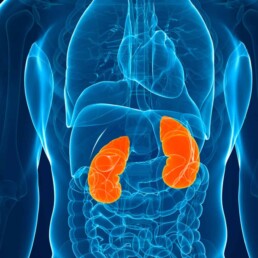Dementia and Chronic Kidney Disease (CKD) are two conditions that have attracted significant attention in the medical community. Though they might seem unrelated at first glance, recent studies have begun to uncover links between the two. This connection is critical to understanding the full scope of these conditions and how they might impact one another.
By Majd Isreb, MD, FACP, FASN, IFMCP
The Prevalence of Dementia in CKD
Kidney failure can lead to cognitive disturbances, affecting mental clarity in individuals. Those with chronic kidney disease may experience varying degrees of cognitive impairment, from mild disruptions to severe debilitations. When this impairment profoundly disrupts daily activities, it leads to dementia.
Early studies found that 13% of patients with CKD have cognitive impairment. The prevalence increases with the advancing stages of CKD independent of the traditional vascular risk factors. However, recent studies found that cognitive impairment affects as many as 62.5% of individuals with chronic kidney disease.
Understanding the Link
Researchers have begun to explore the connection between dementia and CKD, and several theories have emerged.
Vascular Factors
Vascular factors are common in both dementia and CKD, with blood vessel damage playing a significant role. The restriction of blood flow may lead to cognitive decline, and kidney function might also be compromised. In addition, CKD is often associated with vascular dysfunction, arterial stiffness and calcifications, enhanced systemic inflammation, and oxidative stress. All of these can lead to cognitive deficits.
Join us to end the kidney disease epidemic
Uremic Toxins
CKD can lead to the buildup of uremic toxins in the body, affecting various systems, including the brain. These toxins contribute to cognitive impairment and dementia. Uremic toxins, such as indoxyl sulfate, may play a role in cognitive function decline through direct toxicity or indirectly through vascular calcification, endothelial dysfunction, oxidative stress, and inflammation. Some uremic toxins can disrupt the blood-brain barrier, causing further cognitive decline.
Shared Risk Factors
Both conditions share common risk factors, such as hypertension, insulin resistance, and obesity. These conditions may simultaneously increase the risk of developing dementia and CKD, linking them to a complex web of cause and effect.
Management and Prevention
Understanding the connection between dementia and CKD helps in devising strategies to manage and prevent these conditions.
Early Detection
Screening for CKD in individuals with dementia or cognitive impairment can aid early detection and intervention, possibly slowing the progression of both diseases.
Holistic Treatment
Adopting a holistic approach to treating both conditions can ensure they are managed simultaneously, recognizing that they may influence each other.
Lifestyle Modifications
Healthy living, including a balanced diet, regular exercise, and avoiding tobacco, can reduce the risk of developing both dementia and CKD or at least slow their progression. The strategies often overlap, emphasizing a holistic approach to overall health and wellness.
- Diet: A nutritious diet, rich in fiber, antioxidants, omega-3 fatty acids, and low in saturated fats, can boost cognitive health. The Mediterranean diet, for example, has been associated with a reduced risk of dementia. This diet was also recently found to slow the progression of CKD. In CKD, the diet has additional attention to sodium, phosphate, and oxalate content. Monitoring protein intake is also essential.
- Physical Activity: Regular exercise increases blood flow to the brain and promotes cognitive function. It can include walking, jogging, swimming, or other aerobic activities. These can also improve BP control and insulin resistance. Regular exercise was found to slow the progression of kidney disease.
- Stress Management: Chronic stress may increase dementia risk. It was also found to increase the risk for CKD. Meditation, deep breathing exercises, or hobbies can help in managing stress.
- Avoidance of Toxins: Limiting alcohol and avoiding smoking helps to protect cognitive and kidney health. In addition, avoiding over-the-counter medications such as NSAIDs and environmental toxin exposure can help both.
- Blood Pressure Control: Managing blood pressure through diet, exercise, and medication, if needed, is crucial for kidney health. It is also important for vascular and cognitive health.
- Insulin resistance: Many of the above factors can help improve insulin resistance. However, in addition to that, decreasing carb intake, improving sleep, and losing weight can be essential. Reversing insulin resistance can improve cognitive and kidney health.
- Mental Stimulation: Engaging in intellectually stimulating activities like puzzles, reading, or learning a new skill helps to keep the mind sharp. This may be unique to dementia.
The Bottom Line
The connection between dementia and CKD is a complex and multifaceted issue that requires more research to fully understand. However, the links that have been discovered thus far provide crucial insights that can help manage and prevent these conditions. By recognizing that these seemingly disparate conditions are interconnected, healthcare providers can take a more integrative and effective approach to treatment, ultimately benefiting those who suffer from these debilitating diseases.







